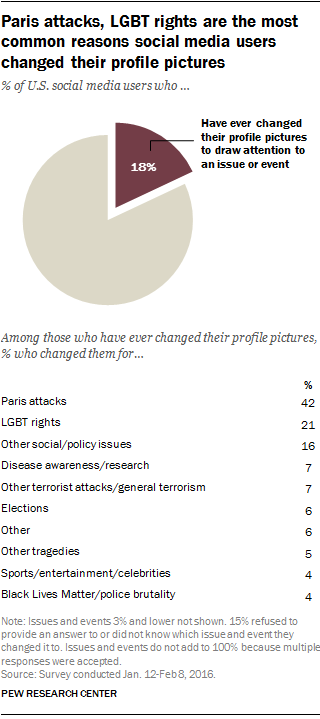In the wake of attacks in Brussels and in Lahore, Pakistan, some social media users are changing their profile pictures to express solidarity with victims and the people of these countries. Social media sites such as Facebook and Twitter have become a common way for Americans to get news, but they also can provide a way for users to respond to it.

A new Pew Research Center survey conducted in association with the John S. and James L. Knight Foundation finds that 18% of U.S. social media users say they have changed their profile pictures to draw attention to an issue or event. Of those who changed their pictures, 42% did so because of the attacks in Paris, many of them applying a filter displaying the colors of the French flag. The survey was conducted Jan. 12 to Feb. 8, before the latest attacks in Belgium and Pakistan.
The other prominent example of social media users seeking to make a statement with their profile picture was over the LGBT rights issue, for which a rainbow-color filter was commonly used; 21% of those who changed their picture did so for this issue. Overall, 7% of all social media users changed their picture in the case of Paris and 4% for LGBT rights. In these two specific instances, Facebook provided a one-click tool to enable users to overlay the French flag and the rainbow filters over their profile pictures.
These two instances far outpaced any other single instance. The category “other social or policy issues” – abortion or gun control, for instance – was named by a combined 16% among those who changed their picture. All others registered in the single digits, such as disease awareness and research, other terrorist attacks or terrorism generally, elections, and other tragedies.

So far there has been a lower level of response for Brussels than for the Paris attacks, according to news reports.
Some portions of the social-media public are more likely to engage in this activity than others. Liberals outpace both moderates and conservatives, with about a quarter (26%) of liberal social media users having changed their pictures in response to an issue or event, compared with 14% of conservatives and 16% of moderates. This rises to three-in-ten liberals ages 18-49. These differences hold even when accounting for age, sex, and race and ethnicity.
Differences also emerge around gender, race and ethnicity, and age. Specifically, female social media users are more likely to change their profile pictures than men, as are black social media users compared with whites and Hispanics. About one-in-five of users ages 18-29 and 30-49 did so, compared with 13% of 50- to 64-year-olds and just 5% of those 65 and older.
The ideological differences that emerge in changing a profile picture at all once again stand out with the two most prominent instances: 11% of all liberal social media users changed their pictures for the Paris attacks, about twice that of conservative and moderate social media users (6% each). The difference is starker for LGBT rights, where 9% of liberals changed their pictures for this issue, compared with just 1% of conservatives and 2% of moderates. Thus, while liberals are overall more likely to be doing this behavior overall, the extent of this difference between ideological groups may in part be due to LGBT rights – one of the two most prominent instances of this behavior – being much more heavily supported by liberals. Again, these differences remain when accounting for age, sex, and race and ethnicity.
Note: Read the full methodology and topline results here (PDF).


